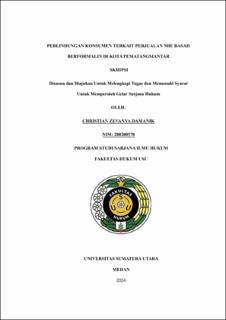Perlindungan Konsumen Terkait Perjualan Mie Basah Berformalin di Kota Pematangsiantar
Consumer Protection Related to the Sale of Formalin-Contaminated Wet Noodles in Pematangsiantar City

Date
2024Author
Damanik, Christian Zevanya
Advisor(s)
Harianto, Dedi
Harris, Abd
Metadata
Show full item recordAbstract
The increasing prevalence of certain wet noodle business operators adding prohibited preservatives into the raw materials used for wet noodle production has led to unclear consumer protection regarding the ingredients used in food processing, creating legal uncertainty and weakening consumer positions. The objectives of this research are to understand consumer protection regarding the sale of wet noodles containing formalin in the city of Pematangsiantar, to examine the responsibility of business operators selling wet noodles with formalin as a food preservative, and to analyze the role of the Pematangsiantar City government in preventing the distribution of formalin containing noodles in the area.
The research method used is normative legal research, conducted through literature studies and supported by field research to obtain the required data, including primary legal materials, secondary legal materials, tertiary legal materials, and interviews. All the collected data were gathered using library research and interview techniques. The research findings are presented descriptively to provide an explanation of the issues discussed.
Based on the research results, it can be concluded that the Pematangsiantar City Government ensures legal certainty for consumer protection through Article 3 of Law No. 8 of 1999 on Consumer Protection, Article 86 paragraph (1) of Law No. 18 of 2012 on Food, and Article 1 point 13 of Government Regulation No. 86 of 2019 on Food Safety. Civil liability for business operators is regulated under Article 19 of the Consumer Protection Law (UUPK), which requires compensation for damage, contamination, and/or consumer losses resulting from consuming produced or traded goods. Criminal liability for business operators using formalin as a preservative is prohibited, and those committing such offenses may face imprisonment. Additionally, administrative responsibilities for business operators include administrative sanctions such as fines, revocation of certificates and/or licenses, temporary suspension of administrative services, and reduction in product production levels.
Collections
- Undergraduate Theses [2698]
